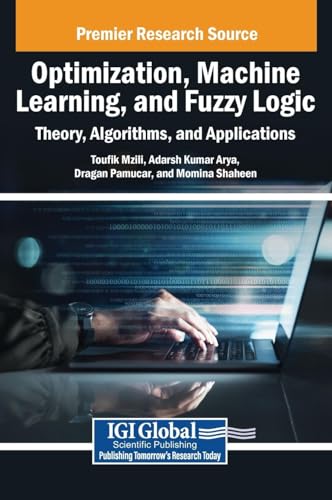
Inhaltsangabe
"This publication offers a comprehensive exploration of optimization techniques, fuzzy logic, and their integration with machine learning. It covers fundamental concepts, mathematical foundations, algorithms, and applications, providing a holistic understanding of these domains"-- Provided by publisher.
Die Inhaltsangabe kann sich auf eine andere Ausgabe dieses Titels beziehen.
Über die Autorinnen und Autoren
Dr. Mzili Toufik holds the position of Assistant Professor in the Department of Computer Science at the Faculty of Science, Chouaib Doukkali University. Recognized as a distinguished researcher, he has made noteworthy contributions to the fields of metaheuristics, optimization, and scheduling problems. His scholarly impact is evident through numerous publications in esteemed Q1 journals. Additionally, Dr. Mzili Toufik has demonstrated his expertise as a peer reviewer for several prestigious journals, showcasing his commitment to advancing the academic discourse in his field.
A competent professional with nearly 20 years of experience in Research and Development / Teaching chemical engineering graduates and post graduates. - Exercises judgment within generally defined practices in selecting methods & techniques for obtaining teaching solutions; ensuring compliance to quality measures and maintenance requisite documentation as well as records - Skills in managing the administrative activities entailing student management, faculty appraisal/training and upholding of the institution's motto - Proficiency in teaching Oil and Gas Pipeline and core chemical engineering subjects to Chemical Engineering Graduate and post graduate students. - Experience in developing curriculum to accommodate different learning styles & maximize students' comprehension - Received research awards - Exposure in working with T.A.N.A.P. Gas Pipeline Project at Worley Parsons. - Exposure in planning and organizing day-to-day research activities and resolving the procedural problem as appropriate to the timely accomplishment of research objectives - An effective leader with proven skills in leading teams during the project phase, training & guiding team members and enabling knowledge sharing among the team
„Über diesen Titel“ kann sich auf eine andere Ausgabe dieses Titels beziehen.
Suchergebnisse für Optimization, Machine Learning, and Fuzzy Logic: Theory,...
Optimization, Machine Learning, and Fuzzy Logic
Anbieter: PBShop.store UK, Fairford, GLOS, Vereinigtes Königreich
HRD. Zustand: New. New Book. Shipped from UK. Established seller since 2000. Artikel-Nr. L2-9798369373521
Neu kaufen
Versand von Vereinigtes Königreich nach USA
Anzahl: Mehr als 20 verfügbar
Optimization, Machine Learning, and Fuzzy Logic
Anbieter: PBShop.store US, Wood Dale, IL, USA
HRD. Zustand: New. New Book. Shipped from UK. Established seller since 2000. Artikel-Nr. L2-9798369373521
Neu kaufen
Versand innerhalb von USA
Anzahl: Mehr als 20 verfügbar

